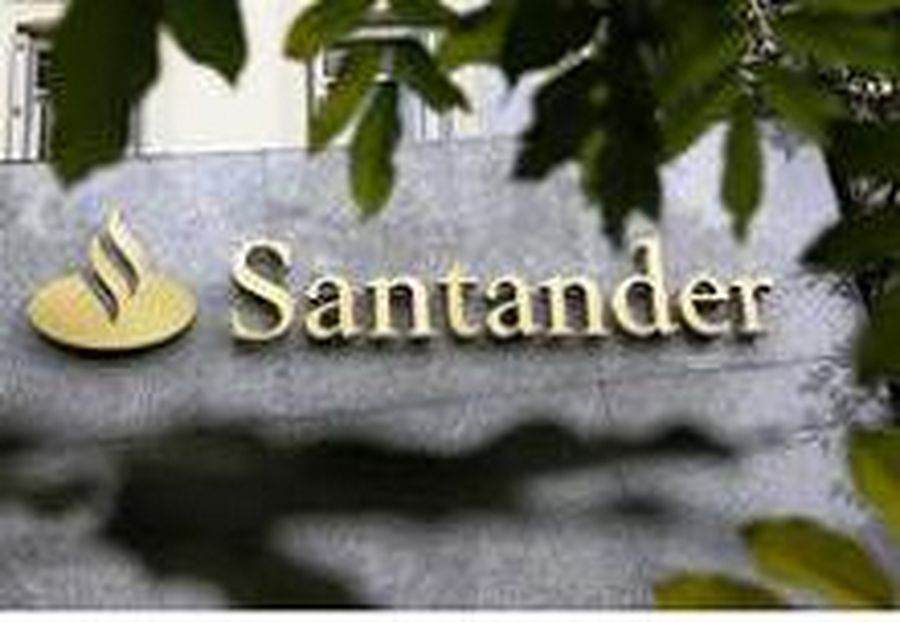
The logo of Spanish bank Santander is seen outside a building in Madrid October 27, 2011. (REUTERS/Andrea Comas)
There’s nothing like a threat by a bank not to call its bonds to get investors foaming at the mouth.
Santander was the latest subject for investors’ ire last week when it announced that an exchange of €6.8bn of Lower Tier 2 debt backed by the implied threat that untendered bonds wouldn’t be called on the expected date.
The offer left bondholders facing a difficult decision: crystalise mark-to-market losses by exchanging outstanding bonds, or hold on to paper that will have to be priced suddenly to maturity and is certain to become entirely illiquid.
Not a pleasant choice, it has to be said.
But does Santander really deserve the opprobrium heaped upon it just because it has signalled to investors that the bonds they bought will continue to be paid precisely in line with the contract?
Of course not.
In these circumstances, investors always say that they thought the bonds would be called, as that is what they were led to believe. But to expect Santander to replace cheap capital with new issues at much more expensive levels in the middle of a crisis of unprecedented proportions is deluded.
Quite simply, times have changed – and so have funding conditions
Yes, Santander could have been more generous and offered a fatter spread on the senior bonds that investors can swap into. But the Spanish giant has always been a sharp operator in the capital markets – investors knew that when they bought its paper.
Besides, the only reason that Santander would pay more than it has to is because it faced a credible threat that investors would punish it in the future.
Investors were making the usual noises last week about boycotting Santander. But they did the same for every other issuer that had refused to call bonds since the financial crisis began – and yet no such boycott ever materialised. The truth is, those threats have no credibility any more – if they ever did – and it is clear that Santander has much more important things to worry about.
More than bragging rights
What to make of the actions last week of Banco do Brasil? The state-owned lender achieved its lowest coupon ever when it sold US$500m of new 2017 bonds. But in doing so it overreached itself to the detriment of other Brazilian borrowers because the ill-timed and overly generous deal caused the short end of the curves of most banks in Latin America to gap 50bp wider.
It was Banco do Brasil’s second such act this year. In May, it printed US$1.5bn in new subordinated 2022 bonds. The deal was the largest subordinated 10-year bond issue ever in the region, but bankers were unanimous that the bank could have tightened its deal, and the curves of other banks, if it had taken a smaller size. The damage took months to be undone.
Bragging rights are all very well, but Banco do Brasil, as a state-owned institution, has an obligation to consider the needs of other Brazilian – and indeed, regional – borrowers.
It has to understand that the success of a quasi-sovereign is measured not only by the good it can do for itself but by what it does for the market.
Long overdue
It’s hard not to have sympathy for Federico Ghizzoni. He took over as chief executive of UniCredit at an incredibly difficult time and has had to steer his bank into an unprecedented market storm.
It is also true that many of UniCredit’s troubles can be laid at the feet of Ghizzoni’s predecessor, Alessandro Profumo, who built an unmanageable empire. It needed dismantling.
But that does not change the fact that he has failed to do enough to overhaul a bank that symbolises the rise and fall of the eurozone better than any other.
His announcement last week of a €7.5bn rights issue – more than half of UniCredit’s market cap – plus aggressive cost saving measures were inevitable but long overdue.
Ghizzoni had the chance to set a precedent for Italian bank capital-raising by undertaking a cash call earlier this year. Instead, he procrastinated, saying he wanted to wait for the outcome of the EBA stress tests and whether UniCredit would be classified as a systemically important financial institution – it was.
While UniCredit stayed on the sidelines fellow Italian lenders, such as Intesa Sanpaolo and Banca Popolare di Milano, strode ahead to significantly improve their Core Tier 1 ratios. Ghizzoni’s delay could prove costly.
Then there’s UniCredit’s bloated business model. Although Ghizzoni is cutting in certain areas, such as investment banking, it is not enough. He needs to rationalise the bank’s presence in Central and Eastern Europe. He also needs to pray that Italy doesn’t further deteriorate.
